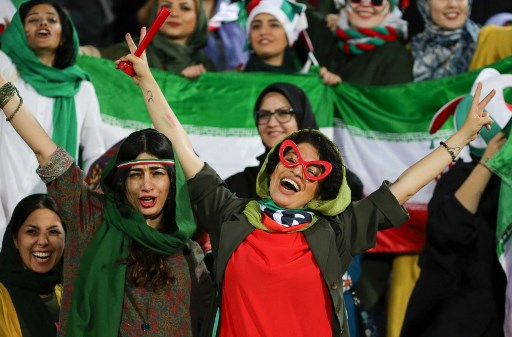For the first time in 40 years, female football fans finally gathered on the bleachers of Azadi Stadium in Tehran to watch the Asia Cup qualifier between Iran and Cambodia. They did not come disguised as men, nor were they afraid to be arrested, nor did they have to jump over walls. They entered by means of official tickets, with international blessing.
A week before, Iranian female football lovers swarmed towards ticket sales offices in Tehran after launching the hashtag “Come with me to the stadium,” which ignited discussions on social media, both in Iran and abroad.
The event comes one month after the death of Sahar Khodayary, an Iranian fan who set herself on fire in front of the Revolutionary Court in Tehran. Dubbed “the blue girl” online for her favorite team Esteghlal’s color, Sahar had been arrested by the police while trying to get into a match between “Esteghlal” and UAE’s “Al-Ain,” disguised as a man.
The blue girl’s suicide was an eye-opener for human rights groups around the world, spurring them to focus on the opression against Iranian women and their deprivation of basic rights that women elsewhere take for granted . It also encouraged FIFA to set conditions for the Iranian government before allowing it to host the Asia Cup qualification, including a threat to annul the contract, unless the authorities issued an official decree allowing women to enter stadiums.
Negotiations took several months and were stuck at times in vicious circles, but in the end, FIFA’s triumph for Iranian women was certain. Stadiums that shunned women for 40 years have now opened their doors to them. This is the end of the authorities’ sex segregation policy which, since the Islamic revolution, had turned the sports’ stadiums into male-only public spaces. Until recent times, women were prohibited from practicing any sports, or forming a sports team, both considered “sinful” by the authorities.

Football is very popular among Iranian women. Not being able to watch it for so long made them even more attached to it, to the point of obsession. As goes the saying, forbidden fruit tastes sweetest. This may be why the blue girl killed herself. Female fans’ first public demonstration against this prohibition dates back to 2006. Then, 50 Iranian women protested in front of Azadi stadium, which was hosting a World Cup qualifier between Iran and Bahrain. The protesters picketed the entrance of the stadium. The white scarves they wore that day gave a name to their movement. In his film “Offside,” Iranian director Jafar Panahi documented the White Scarves Movement. Their voices were heard in major international film festivals. This is when the pressure on the government began.
The election of Swiss businessman Gianni Infantino, whose motto was “Football for All”, as president of FIFA represented a glimmer of hope for Iranian female fans. Two years ago, after attending the match between the two most popular Iranian teams, Esteghlal and Persepolis, Infantino took President Rouhani by surprise when he brought up the question of banning women from watching football. “Rouhani promised to solve this issue, but he said it needed some time,” tweeted Infantino from back home. In another tweet, FIFA president added: “I’m optimistic about Rouhani’s promise. We, too, in Switzerland, took a long time to give women the right to vote, but we succeeded in the end.”
After his meeting with Rouhani, and as he walked with him to the stadium, Infantino did not hear the 30 women at the back entrance who were shouting for his attention. Men’s voices were much louder, inside the stadium and outside. And so the ban continued, with all the humiliation, violence, and detention that it entailed. No official took any step toward removing the ban. The law stayed the same.
And Iranian women continued to fight.
In a smart move, prior to the current qualification tournament, women sent more than 20,000 emails into Infantino’s inbox, telling him about the ongoing ban, and that their government had lied to him. This led Infantino to write a letter to the Iranian authorities, inquiring about the promise he was given, demanding a date be set for lifting the ban, and threatening to cancel the games should women not be allowed to attend.
At the beginning, the Iranian government was evasive. The decision is not up to Rouhani , nor the minister of sports; it is in the hands of religious authorities. Their answer was “we agree with FIFA’s demands, but we are still working on it”. But this time, FIFA’s response was firmer. The game’s governing body was now talking of annulling Iran’s contract and move the tournament to Taipei instead.
But money can break every barrier and taboo, even religious ones. The games were meant to revive Tehran’s economy, already exhausted by international sanctions, and to pump foreign currency into the market which would boost local currency, too. Therefore, Iranian authorities gave in to FIFA’s demand before it was too late.
And so by the sacred power of money, women’s entry to football stadiums is no longer considered “sacrilegious”.






